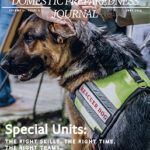In September 2016, more than 30 people gathered at the Harvard Faculty club to discuss topics related to leadership and the decision-making process. Most in the room had been faced with making critical life-and-death decisions at some point in their careers, and some on a regular basis. These participants were asked to share their knowledge about what it takes to make high-consequence decisions.
Participants represented the first responder communities of law enforcement, fire service, and emergency medical service (EMS), as well as emergency management and academia from local, state, and federal agencies. The discussion was framed in the context of meta-leadership, beginning with the self-regulation and emotional intelligence of the person, expanding to the situation at hand to understand the knowns, the known unknowns, and the unknown knowns of the environment, and then linking to support the conductivity of many organizations and individuals to galvanize collective intelligence toward a unity of effort in decision making. The meta-leadership framework depicts conductivity in three equally important directions: calling for individuals and communities to lead up, down, and across to enable a true realization of collective intelligence, which reveal outcomes that may be impossible achieve in isolation.
One dominant theme of this dialogue was relationships. The characteristics and dynamics of developing and sustaining meaningful conductivity in a crisis event is greatly impacted by the relationships that have been forged long before the crisis at hand emerged. On a day-to-day basis, people are immersed in their own roles, and it takes time to consider broader implications of their processes and plans. The conversation emphasized the need to cultivate understanding across many perspectives to include political leaders, private sectors, traditional media, and social media, as well as the responder communities of law enforcement, EMS, and fire service. In establishing these connections, building partnerships, and gaining a better understanding, there will be a greater possibility of surfacing the unknown unknowns prior to a crisis event and aid in decision making that results in desired outcomes.
To actualize this focus on building relationships and ultimately trust, it is necessary to come back to the center of the meta-leadership model: the individual person. Each relationship begins with one person connecting with another. If one individual is not receptive or prepared to connect, the connection will not occur. The discussion addressed this in exploring education to facilitate diverse understanding and the development of habits based on this expanded learning rather than reverting back to quick decisions based on primal instincts. This is not to say that decisions are solely made with the mind and thinking. The compassionate heart and the gut of experience also play important roles. However, it is important to consciously practice integrating the head, heart, and gut into the decision-making process.
This practice does not always come together easily. Many times, it is important to work with others who have value disagreements. Making a habit of participating in forums such as this diverse gathering provides a safe place and invaluable opportunity to navigate value conflict, build relationships, understand different perspectives, and cultivate more opportunities to collaborate and share information.
American psychologist B.F. Skinner is noted for saying, “If it’s going to be, it’s up to me,” which is motivating for the individual person, at the center of the meta-leadership model. Whereas, writer and activist Helen Keller expands this thought to the broader community of partnerships and connectivity by stating that, “Alone we can do so little, together we can do so much.”

Wendy D. Walsh
Wendy D. Walsh currently serves as the program manager for FEMA’s Higher Education and Executive Academy Programs. Prior she served as the Homeland Defense & Security Coordinator for the Naval Postgraduate School for 10 years and served the State of California for 12 years. She has a BA in Political Science and Master in Public Administration from Sonoma State University. She holds certificates in Systems Engineering from the Naval Postgraduate School and Design, Partnering, Management & Innovation from the Middlebury Institute of International Studies.
- This author does not have any more posts.






